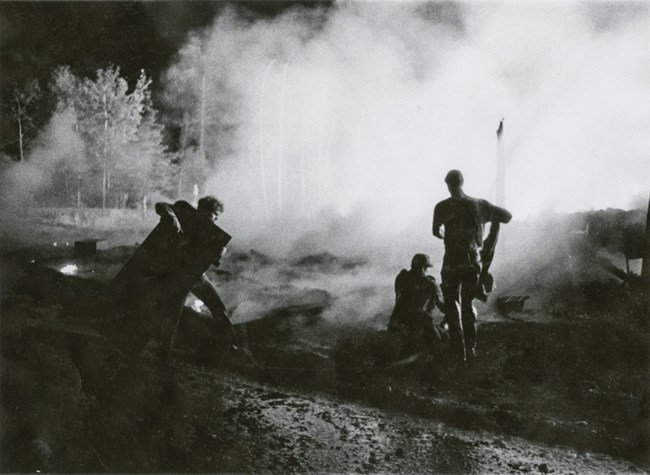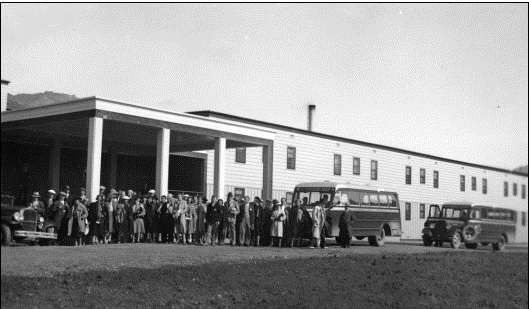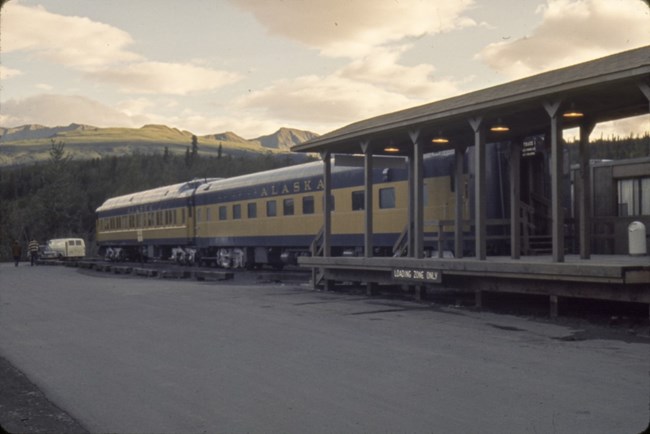Last updated: February 2, 2025
Article
The McKinley Park Hotel Fire
By Kiana Carlson, Museum Technician
Published September 2022
Fifty years ago, during one of busiest weekends of the year, a fire blazed through the old McKinley Park Hotel burning most of the structure to the ground. On the night of September 3rd, while guests were enjoying dinner, a waitress noticed a fire in the kitchen. The fire, believed to have started due to old and faulty wiring, quickly spread throughout the building. Guests, employees, and park officials responded efficiently and without panic leading everyone to safety with little to no injuries. One guest stated, “The calm and professional way in which the young people who worked at the lodge directed everyone helped dispel any moments of nervous reaction.” Others also attributed the successful evacuation to previous routine fire-drills.

DENA 2244
While all guests and personnel were safe, unfortunately the hotel itself could not be saved. Although a valiant effort was made by each person present to save the structure, the fire-fighting effort was eventually diverted to stop the fire from spreading to nearby buildings and trees in order to limit the risk of a wildfire catching. In the end, the only buildings standing were the powerhouse, the recently constructed west wing, and a dormitory. The main hotel building, including the lobby, was nothing more than a few timbers and blackened coals.
The hotel had been in operation since opening in 1939 following two years of construction. At the time of its construction, accommodations for park visitors were few and far between. The main accommodation was run by the Mount McKinley Tourist & Transportation Company, which operated a camp at Savage River until the hotel opened on June 1, 19391. Only steps away from the railroad depot, the McKinley Park Hotel quickly became the main hub for visitors with its modern amenities, bus tours, and interpretive presentations all under one roof. For the next 34 years, the hotel continued to be the main accommodation and de-facto visitor center for park visitors.

DENA 1937
Following the fire, discussion immediately began on what would become of the McKinley Park Hotel with numerous public meetings taking place to address the matter. The tourism industry had been steadily increasing in Alaska and many state officials, including Senator Ted Stevens and Congressman Nick Begich, recognized the importance of a hotel in the park. Re-building the park hotel therefore became a major priority as Senator Stevens stated, “turning this unfortunate event into a plus for our park’s development by bringing to light the park’s long-range developmental needs in meeting our state’s growing tourist traffic.” Ideas of what to do next varied as some wanted to keep the hotel the same as before while others saw an opportunity of moving the location of the hotel entirely, arguing that the hotel should have a view of Mount McKinley.2

DENA 5746
While plans for a permanent hotel were being discussed, it was decided that a temporary solution was needed in order to accommodate the visitors coming in the 1973 summer season. The “temporary” hotel was hastily built over the winter and was comprised of the still-standing west wing, new modular units, and several railroad cars. This “temporary” solution stayed in operation for the next 28 years, almost the same length of time as the original hotel had been in operation. The “temporary” hotel was eventually dismantled in 2001 after it was determined that there were sufficient accommodations for visitors outside of the park, and the Denali Visitor Center was built in its place. Today, the only remnant of the original McKinley Park Hotel is the powerhouse, which is listed on the register of historic places.
1 After closing their Savage River camp, Mount McKinley Tourist & Transportation Company continued to provide transportation services into the park until 1941.
2 One member of the public stated, “How could a hotel pretending to serve tourists arriving to see Mt. McKinley be located completely out of sight of the biggest mountain in all of North America?”
